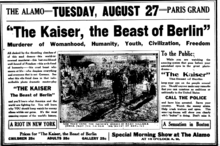The Kaiser, the Beast of Berlin
| The Kaiser, the Beast of Berlin | |
|---|---|
_-_1.jpg) Still of the Kaiser in the "scrap of paper" scene | |
| Directed by | Rupert Julian |
| Produced by | Rupert Julian |
| Written by |
Rupert Julian Elliott J. Clawson |
| Starring |
Rupert Julian Elmo Lincoln Nigel De Brulier Lon Chaney Harry von Meter |
| Cinematography | Edward A. Kull |
Production company |
Renowned Pictures Corporation |
| Distributed by | Universal Jewel |
Release date |
|
Running time | 70 minutes |
| Country | United States |
| Language | Silent (English intertitles) |
The Kaiser, the Beast of Berlin (also known as The Beast of Berlin and The Kaiser) was a 1918 American silent war propaganda melodrama film written by, directed by, and starring Rupert Julian. The film's supporting cast included Elmo Lincoln, Nigel De Brulier, and Lon Chaney.[1]
The germanophobic film contains a propagandist view of the First World War, showing the political greed of the German Kaiser Wilhelm II, the resistance of some of his own soldiers, and fanciful prediction of the nature of the war's end.[2] The film is now considered lost.[3]
Synopsis

Kaiser Wilhelm II of Hohenzollern (Rupert Julian) is a vain and arrogant tyrant eager for conquest. When Belgium is invaded by the German army during World War I, Marcas, the blacksmith (Elmo Lincoln), although wounded, is able to save his daughter from the clutches of a German soldier. Soon after this, the RMS Lusitania is sunk by Captain von Neigle (Nigel De Brulier), who ultimately is driven mad with remorse. After the United States declares war, the Allied generals turn the Kaiser over to Albert I of Belgium. Incarcerated, the Kaiser faces his jailer, Marcas the blacksmith.
Cast
- Rupert Julian as The Kaiser
- Elmo Lincoln as Marcas, the Blacksmith
- Nigel De Brulier as Captain von Neigle
- Lon Chaney as Bethmann-Hollweg
- Harry von Meter as Captain von Hancke
- Harry Carter as General von Kluck
- Joseph W. Girard as Ambassador Gerard
- Harry Holden as General Joffre
- Alfred Allen as General John Pershing
- C.E. Anderson as Captain Kovich
- W.H. Bainbridge as Colonel Schmiedcke
- Henry A. Barrows as General Douglas Haig
- F. Beauregard as General von Weddingen
- Walter Belasco as Admiral von Pliscott
- Betty Carpenter as Bride
- Edward Clark as General Erich von Falkenhagen
- Ruth Clifford as Gabrielle
- Wallace Coburn as General Rüdiger von der Goltz
- F. Corcoran as General von Hoetzendorf
- Orlo Eastman as President Woodrow Wilson
- Mark Fenton as Admiral von Tirpitz
- Robert Gordon as Louis Lomenie
- Winter Hall as Dr. Von Gressler
- Wadsworth Harris as General von Ruesselheim
- Georgie Hupp as Little Jean
- Ruby Lafayette as Grandmother Marcas
- Gretchen Lederer as Bertha von Neigle
- Frankie Lee as Hansel
- Jack MacDonald as King Albert
- K. Painter as General Hans von Beseler
- Zoe Rae as Gretel
- Allan Sears as Captain von Wohlbold
- Jay Smith as Marshal von Hindenburg
- Pedro Sose as General Porfirio Díaz
Production notes
Although frequently listed as a Universal Studios production, the film was an independent production produced by Rupert Julian for Renowned Pictures. Julian licensed the distribution rights to Renowned, who in turn sold the rights to Universal Jewel for worldwide distribution.
Reception
The Kaiser, the Beast of Berlin was an enormous hit when it was released,[4] and Universal spared no expense in advertising the film. Universal studio head Carl Laemmle pushed the film to the theater owners as hard as he sold it to the viewing public. "A whirlwind of Applause - A Landslide of Money," "Unparalleled Receipts," and "The Picture That Blocked Traffic on Broadway" were some of the headlines for ads that ran in trade publications in an attempt to get theater owners to book the picture.
According to a report in Exhibitor's Trade Review on the film's success in Omaha, 14,000 saw the film there in a single week, a record for that city. "Wild cheering marked every show when the young captain socked the Kaiser on the jaw. Patriotic societies boosted the picture because of its aid in stirring up the country to war. Street car signs were used; huge street banners swung over the crowds in the downtown district, and a truck paraded the streets with the Kaiser hanging in effigy and a big sign 'All pro-Germans will be admitted free.' None availed himself of the invitation."[5]
Rupert Julian received rave reviews for his portrayal of the Kaiser and later reprised the role in many subsequent films.[6][7]
Preservation status
No known prints of the film survive. The Kaiser, the Beast of Berlin is one of the films included on the American Film Institute's list of the "Ten Most Wanted" lost films.[8]
In popular culture
In 1919, a short (two-reel) parody of the film was released titled The Geezer of Berlin.[5]
See also
References
- ↑ Bodeen, DeWitt (1976). From Hollywood: The Careers of 15 Great American Stars. A. S. Barnes. p. 228. ISBN 0-498-01346-4.
- ↑ Neale, Stephen (2000). Genre and Hollywood. Psychology Press. p. 119. ISBN 0-415-02606-7.
- ↑ Waldman, Harry (2000). Missing Reels: Lost Films of American and European Cinema. McFarland. p. 254. ISBN 0-786-40724-7.
- ↑ Blake, Michael F. (2001). The Films of Lon Chaney. Madison Books. p. 83. ISBN 1-568-33237-8.
- 1 2 Mock and Larson, 152
- ↑ Keil, Charlie; Singer, Ben, eds. (2009). American Cinema of the 1910s: Themes and Variations. Rutgers University Press. p. 215. ISBN 0-813-54445-9.
- ↑ Quinlan, David (1983). The Illustrated Guide to Film Directors. Rowman & Littlefield. p. 157. ISBN 0-389-20408-0.
- ↑ American Film, Volume 5, Issues 1-10. American Film Institute. 1979. p. 71.
External links
- The Kaiser, the Beast of Berlin on IMDb
- The Kaiser, The Beast of Berlin at silentera.com
- Period advertisements for the film: